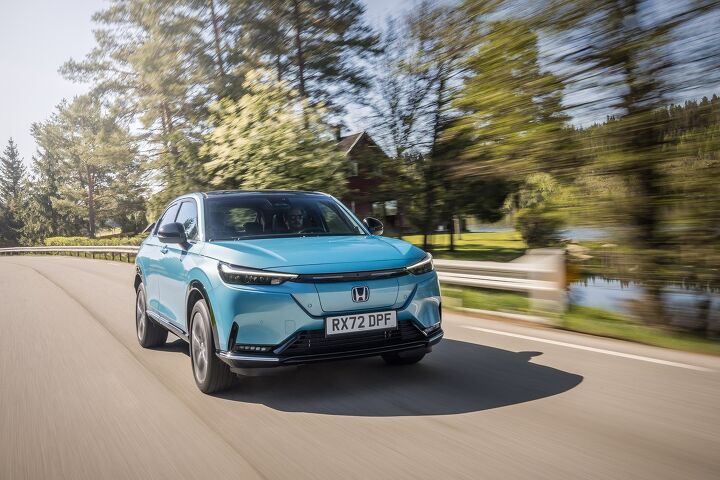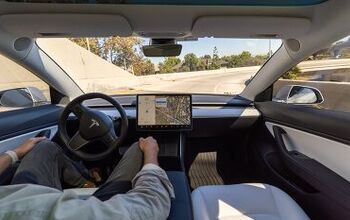Report: Honda e:Ny1 to Drop Terrible Name

Honda is said to be changing the naming of its electric cars after customers, particularly those in China, found its name to be exceptionally difficult to pronounce. However, they weren’t the only ones. Europeans likewise didn’t appreciate the name, nor the odd choice of punctuation and capitalization that seems to plague some all-electric vehicles.
Your author has a admittedly ludicrous theory that some manufacturers have been giving compliance EVs terrible names because they subconsciously hope that people won’t buy them. This is pure speculation, obviously, and probably incorrect. But it’s difficult to imagine the meetings where they settled on Toyota bZ4X or Honda e:Ny1 ending in anything other than some soft crying.
Officially, the e:N prefix is supposed to stand for the new electric platform that will underpin Honda’s all-electric vehicles in the coming years (watch that change) and the y1 is the model designation. But this is even worse than when companies (e.g. Polestar or Tesla) simply give each model a single number or letter to identify itself. Besides, Honda already has a complete lineup of vehicles with excellent names — making the alphanumeric stuff that more confusing.
Despite nobody really digging the moniker, Honda has told Autocar that it only plans on changing the name of the model in China (as part of a more comprehensive facelift) because that’s where they’re having the most trouble and anticipated the largest sales volumes. But there have been rumors it might see its name change elsewhere, too.
“Customers in China just can’t pronounce it,” explained the source.
From Autocar:
In China, Honda uses either the e:NS1 or e:NP1 name for its small electric SUV, depending on whether the car is made by its joint venture with Dongfeng or that with GAC, while in Europe it uses e:Ny1.
Under the new naming scheme, Honda in China has kept the P and S letters depending on which joint venture builds the car, meaning it could in Europe rename the car the Y1.
Keeping the Y element would also avoid awkward conversions with McLaren or Audi if using the P1 or S1 name.
Audi has been very protective of its naming system, last year forcing Chinese EV maker Nio to change the name of its ES6 and ES8 SUVs on the basis that they sounded too much like S6 and S8.
The new P7/S7 is the first of Honda’s new Ye Series cars, based on a newly developed EV-specific platform. Honda has said it will launch a total of 10 new EVs in China by 2027.
If this sounds confusing, it’s because Honda actually wants to distinguish its all-electric models from the rest of its fleet. The brand believes it can sell EVs in China and simultaneously move EVs upmarket. Frankly, that sounds like an insane gamble if it were being done inside North America. But China sees EV proliferation as the best way to overtake the automotive industry, giving Honda an arguably better chance there.
While other nations have historically dominated the automotive detector, China currently rules the battery market without any direct peers. By doing what it can to pivot the whole world toward all-electric vehicles, it’s putting itself in a good position to become globally relevant in terms of automotive construction. Truth be told, the sheer number of parts suppliers situated within the nation already make China an essential part of most vehicle’s supply chain. However, the Chinese government feels like the path forward is to create global EV brands that will out-compete legacy manufacturers from other countries.
Market conditions have changed quite a bit in recent years as the economy weakened. But most companies still see China as one of the few markets where small, affordable EVs have a chance of turning a profit. Unfortunately, this also meant the market was flooded with those exact types of models — making the segment very competitive with leaner margins than most automakers would have hoped for. Oversupplying has become a problem, meaning Honda is going to need every advantage it can get if it wants to stay in the fight.
Sadly, Autocar stated that the brand is already having difficulties here as loads of Chinese EV brands continue going under. The e:NS2 mid-size hatchback that was recently launched in China is reportedly being sold at a substantial loss and went to market with the naming convention the company is now considering abandoning.
Meanwhile, the relatively small e:Ny1 that also presently sells in the United Kingdom for £39,995 (roughly $50,200 USD at the current exchange rate) is being heavily discounted to ensure the company hits regional emissions targets after opting not to sell the even smaller Honda E. That presumably isn’t solely the result of it having a lackluster name and likely has more to do with the fact that that’s fairly expensive for the segment it’s trying to occupy. That's something we have seen on our market and more than occasionally.
[Image: Honda]
Become a TTAC insider. Get the latest news, features, TTAC takes, and everything else that gets to the truth about cars first by subscribing to our newsletter.

A staunch consumer advocate tracking industry trends and regulation. Before joining TTAC, Matt spent a decade working for marketing and research firms based in NYC. Clients included several of the world’s largest automakers, global tire brands, and aftermarket part suppliers. Dissatisfied with the corporate world and resentful of having to wear suits everyday, he pivoted to writing about cars. Since then, that man has become an ardent supporter of the right-to-repair movement, been interviewed on the auto industry by national radio broadcasts, driven more rental cars than anyone ever should, participated in amateur rallying events, and received the requisite minimum training as sanctioned by the SCCA. Handy with a wrench, Matt grew up surrounded by Detroit auto workers and managed to get a pizza delivery job before he was legally eligible. He later found himself driving box trucks through Manhattan, guaranteeing future sympathy for actual truckers. He continues to conduct research pertaining to the automotive sector as an independent contractor and has since moved back to his native Michigan, closer to where the cars are born. A contrarian, Matt claims to prefer understeer — stating that front and all-wheel drive vehicles cater best to his driving style.
More by Matt Posky
Latest Car Reviews
Read moreLatest Product Reviews
Read moreRecent Comments
- Varezhka I have still yet to see a Malibu on the road that didn't have a rental sticker. So yeah, GM probably lost money on every one they sold but kept it to boost their CAFE numbers.I'm personally happy that I no longer have to dread being "upgraded" to a Maxima or a Malibu anymore. And thankfully Altima is also on its way out.
- Tassos Under incompetent, affirmative action hire Mary Barra, GM has been shooting itself in the foot on a daily basis.Whether the Malibu cancellation has been one of these shootings is NOT obvious at all.GM should be run as a PROFITABLE BUSINESS and NOT as an outfit that satisfies everybody and his mother in law's pet preferences.IF the Malibu was UNPROFITABLE, it SHOULD be canceled.More generally, if its SEGMENT is Unprofitable, and HALF the makers cancel their midsize sedans, not only will it lead to the SURVIVAL OF THE FITTEST ones, but the survivors will obviously be more profitable if the LOSERS were kept being produced and the SMALL PIE of midsize sedans would yield slim pickings for every participant.SO NO, I APPROVE of the demise of the unprofitable Malibu, and hope Nissan does the same to the Altima, Hyundai with the SOnata, Mazda with the Mazda 6, and as many others as it takes to make the REMAINING players, like the Excellent, sporty Accord and the Bulletproof Reliable, cheap to maintain CAMRY, more profitable and affordable.
- GregLocock Car companies can only really sell cars that people who are new car buyers will pay a profitable price for. As it turns out fewer and fewer new car buyers want sedans. Large sedans can be nice to drive, certainly, but the number of new car buyers (the only ones that matter in this discussion) are prepared to sacrifice steering and handling for more obvious things like passenger and cargo space, or even some attempt at off roading. We know US new car buyers don't really care about handling because they fell for FWD in large cars.
- Slavuta Why is everybody sweating? Like sedans? - go buy one. Better - 2. Let CRV/RAV rust on the dealer lot. I have 3 sedans on the driveway. My neighbor - 2. Neighbors on each of our other side - 8 SUVs.
- Theflyersfan With sedans, especially, I wonder how many of those sales are to rental fleets. With the exception of the Civic and Accord, there are still rows of sedans mixed in with the RAV4s at every airport rental lot. I doubt the breakdown in sales is publicly published, so who knows... GM isn't out of the sedan business - Cadillac exists and I can't believe I'm typing this but they are actually decent - and I think they are making a huge mistake, especially if there's an extended oil price hike (cough...Iran...cough) and people want smaller and hybrids. But if one is only tied to the quarterly shareholder reports and not trends and the big picture, bad decisions like this get made.



































Comments
Join the conversation
Now if we could only get Toyota to change BZ4X...
"compliance EVs" - so typically Posky. Come on, Matt, come clean about what Big Oil is paying you already.